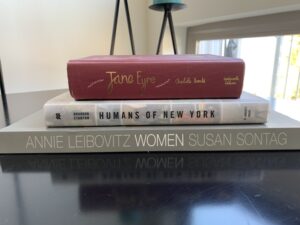Changing Everything
If you want to learn about a culture, listen to the stories.
If you want to change a culture, change the stories.
This quote by Michael Margolis speaks volumes. It can be thought of on a wide-scale level: our culture, as a whole. But it is equally applicable and important at an individual level.
Maybe most concisely stated like this:
If you want to change, change your stories.
When I began working with the ancient, sacred stories I love, I became crystal clear about what made me crazy and super-frustrated with how their stories had been told over thousands of years: Deeply-ingrained patterns layered onto the page and in between the lines that shamed women who had opinions or used their voice, that believed women to be dangerous who were different, that kept women contained so that they did not disrupt systems of (or persons with) power.
When I looked closer still, something else became crystal clear: what made me crazy and super-frustrated with their stories was exactly what made me feel the same about my own.
MY story was made up of deeply-ingrained patterned beliefs that found me withholding my opinions and quieting my voice, opting to not be different (and certainly not dangerous), to not disrupt the system or upset the apple cart; instead, to play by the rules, be good, stay inside the lines.
That had to change. I had to change. Everything had to change.
Truth-be-told, I found it far easier to change stories that are thousands of years old, than to do the same with my own. I could endlessly talk about Eve (which I continue to do) – praising her for eating the fruit, listening to the serpent, following her desire, and honoring her own wisdom. But to do that for myself? To tell and live that story? Much, much harder. And…ongoing; a life’s work, to be sure.
As I’ve remained committed to reimagining, retelling, and redeeming ancient, sacred stories, I’ve worked to do the same for myself. And I’ve learned a few things along the way:
-
The stories we’ve been told, the way they’ve been told, live deep within us. Sometimes for good; sometimes, not so much.
-
Those stories (and the lessons within) turn into the stories we tell ourselves – the inner-voice that constantly reminds us we are too much, not enough, potentially both.
- When we listen to these stories, name them, acknowledge them honestly, and choose to change them, we can then begin the work and practice of telling and living the stories we desire and deserve.
Every bit of this is sacred practice; responsibility, privilege, and gift. It’s also the most important thing we can possibly do.
When we change our stories, we change everything.
And perhaps it’s dangerous and disruptive to say so, but changing everything is what matters most, what’s required of us, what we’re called to – for ourselves and for our world.
May it be so.
*****
The process and practice I have developed with ancient, sacred stories (and my own) is probably the most concise way for me to describe what my 1:1 work is about: inviting you to name the stories that have made you you, then helping you reimagine and rewrite them in ways that empower, embolden, and, well, change everything!
I currently have space for new clients. Book a free, 30-minute call with me. No pressure or obligation – just a chance to chat (which I’d LOVE).
*****
Photo by S O C I A L . C U T on Unsplash
 Here’s an example: three books stacked together in my home:
Here’s an example: three books stacked together in my home: